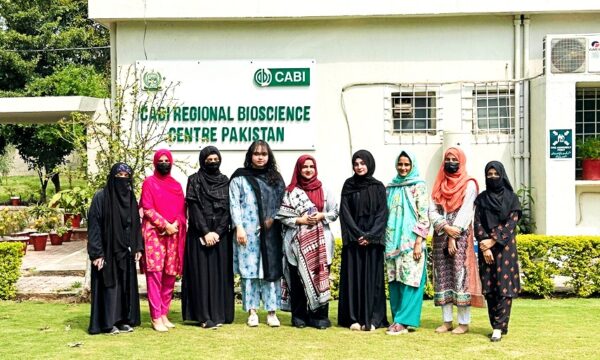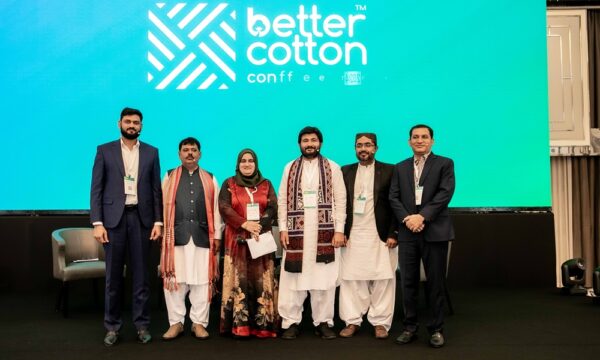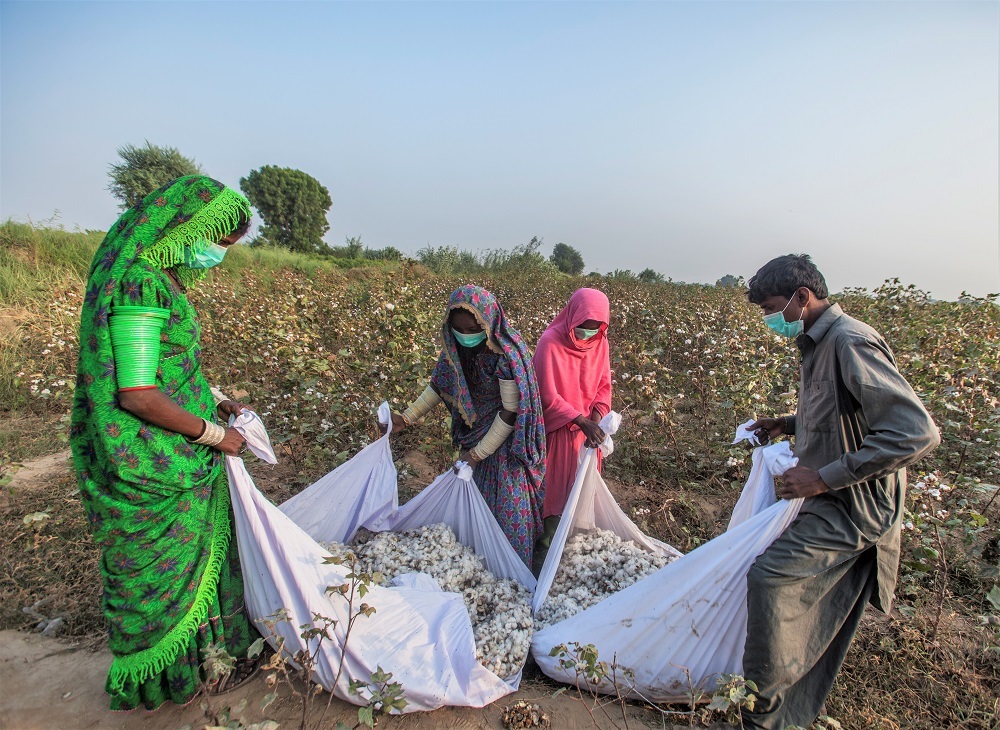
CABI’s ongoing partnership with the Better Cotton Initiative (BCI) is paying dividends in helping to transform agricultural practices in Pakistan’s cotton sector. This article highlights the progress of this work as part of World Cotton Day today (Tuesday 7 October 20205).
With funding from the Better Cotton Growth & Innovation Fund (BC GIF), the “Producing Better Cotton in Pakistan” project is empowering farmers in Sindh and Punjab to adopt sustainable practices and improve cotton productivity, quality, and livelihoods.
Cotton is Pakistan’s largest industrial sector, yet poor traditional agricultural practices are costing the industry around 10–15% of its value. Misuse of pesticides and water, improper fertilizer application, inefficient storage, and limited knowledge all take a toll on productivity and quality. CABI’s project, grounded in the Better Cotton Standard System (BCSS) and Good Agricultural Practices (GAP), seeks to reverse that trend.
A Lifeline for Pakistan’s Cotton Industry
With a focus on participatory training and field-based demonstrations, the initiative is not only improving cotton yields but also supporting the social and environmental sustainability of cotton production. In Sindh, over 31,000 male and 50 female farmers have been trained, while 17,990 male and 12 female farmers in Punjab have been equipped with the tools and knowledge to embrace sustainable cotton practices.
CABI has introduced practical and impactful methods to help farmers tackle common challenges in cotton cultivation. Farmers now benefit from hands-on training in soil testing and fertility management, including the use of compost instead of synthetic fertilizers. A new Soil Testing Laboratory established in CABI’s Centre in Pakistan in August 2024 supports this effort by offering localized, science-backed solutions.
Demonstration plots — 1,920 in total — serve as living laboratories where farmers can observe the benefits of environmentally friendly practices such as yellow sticky traps for pest control, light traps for monitoring, attractant crops to encourage biodiversity, and composting techniques for soil enrichment.

Uplifting Women in Cotton Communities
Empowering women remains a central pillar of the initiative. In regions where women often lack access to land or income-generating opportunities, the project is creating meaningful change.
Twenty-five sewing centres were set up across 12 producer units (which consist of different numbers of hectares), benefiting 96 women, 90 women received goats to initiate small-scale livestock ventures, 40 women farmers gained access to land through a land rental support program, 1,826 women began kitchen gardening, boosting household food security and income and 10 women established self-help businesses through entrepreneurship training.
Buying a sewing machine is a major cost in Pakistan. However, the project is bearing the cost of procurement and provided sewing machines to female farm worker so that they can support their livelihood.
These interventions are not only improving women’s earnings but also contributing to children’s education and overall family welfare. Several women have also been connected to government social support schemes to ensure long-term security.
Specialized training in cotton-picking techniques, workplace safety, child labour prevention, and female empowerment has also equipped women to work more safely and effectively in the fields.
Ensuring Decent Work and Workers’ Rights
In line with Better Cotton’s Decent Work Strategy roadmap, CABI is taking comprehensive steps to protect farm workers’ rights and welfare.
Key components include:
- Labour Compliance: All activities follow national and provincial labour laws, ensuring fair wages, reasonable working hours, and occupational safety.
- Labour Monitoring & Remediation: Regular workplace assessments help identify issues and drive corrective actions to improve worker well-being.
- Grievance Mechanism: A free, confidential system is available for workers to report complaints regarding conditions, promote fair wages, discrimination, or harassment.
- Child and Forced Labour Prevention: Awareness campaigns and community engagement stress the importance of education and safe labour practices.
- Women’s Safety: Sensitization sessions and clear protocols foster a respectful and secure working environment for women.
Local Capacity Building and Sustainable Growth
The training of 77 local male and female agricultural graduates in Punjab has created a cadre of field experts who support farmers with advice on crop science, pest management, soil health, and sustainable resource use. These professionals serve as vital links between scientific research and everyday farming practices.
In Punjab alone, over 18,000 farmers and 4,887 workers have been trained in Better Cotton principles. Supporting this, 70 compost units were established, along with 2,220 yellow sticky traps, 1,500 pheromone traps, and 400 light traps to reduce pest pressure sustainably.
To enhance women’s economic empowerment further, three additional sewing centres were established in Punjab, providing training and income opportunities for more than 25 women.
A Model for Sustainable Agriculture
CABI’s success with Better Cotton demonstrates a scalable, impactful model for transforming agriculture in Pakistan. The project now covers 41,231.5 hectares of cotton fields, contributing not only to higher yields and better-quality cotton but also to healthier communities and a safer environment.
With an extended timeline – another three years in Sindh (reaching 33,000 more farmers) and one more year in Punjab (supporting 18,202 additional farmers) – the future of cotton in Pakistan looks promising. This collaboration stands as a testament to the power of innovation, inclusion, and sustainability in agriculture.
By sowing the seeds of better practices today, CABI and Better Cotton are cultivating a stronger, more resilient cotton sector for tomorrow — one that sustainably works for farmers, for workers, and the environment.
Additional information
Main image: (Credit: CABI).
For more information contact
Dr Habat Ullah Asad, Project Manager, Project Better Cotton Sindh, a.asad@cabi.org
Muhammad Waseem Ishaq, Project Manager, Project Better Cotton Punjab, m.waseem@cabi.org
Relevant project
Producing better cotton in Pakistan
Farmer testimonials
Muhammad Luqman
Muhammad Luqman farms in Village Agro Rahoo, Taluka Saeedabad, District Matiari, Sindh.
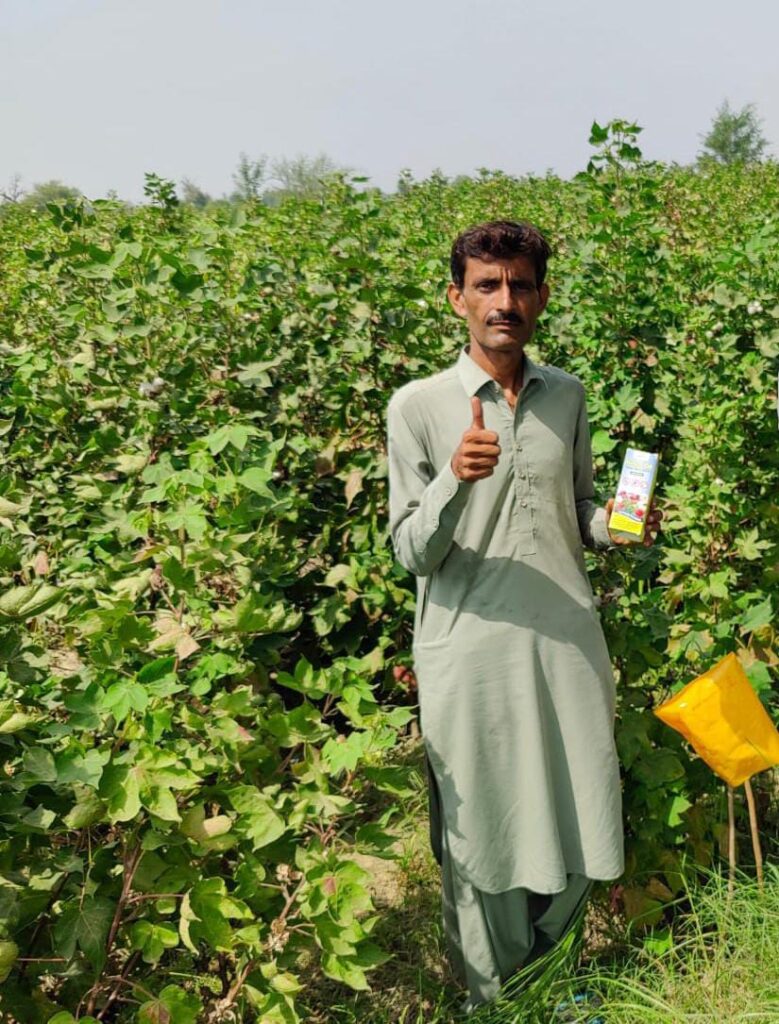
Q1. How has CABI/Better Cotton project supported you in cotton farming?
The CABI/Better Cotton project has helped me improve my cotton farming in many ways. I received training on better field practices like proper pesticide use, water management, and soil care. These changes have made my farm more productive and reduced my costs. I also learned how to protect the environment and keep my family safe from harmful chemicals.
Q2. What positive changes have you experienced (e.g., yield, income, practices, environment, family)?
Since joining the CABI/Better Cotton project, I’ve seen real improvements in my farming and my life. My cotton yield has increased because I now follow better practices like timely sowing, proper pest control, and efficient water use. My income has also grown, allowing me to invest in my children’s education and improve our living conditions. I’ve learned how to reduce chemical use and protect the environment, which has made my farm healthier and safer for my family.
Q3. What message would you like to share on World Cotton Day?
On World Cotton Day, I want to remind everyone that cotton is more than just a crop – it’s our livelihood, our heritage, and our pride. I believe that when farmers are given knowledge, respect, and fair opportunities, they can grow not just better cotton, but a better future.
Farmer Poori
Poori farms in Village Waheed Nizamani, Taluka and District Sanghar, Sindh.
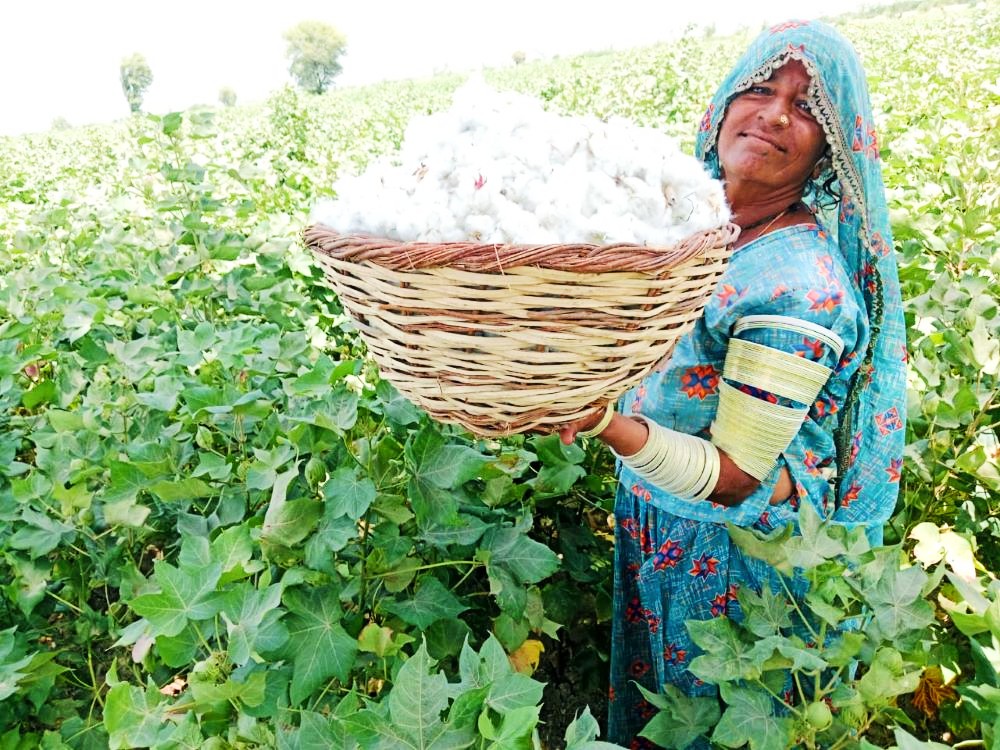
Q1. How has CABI-Better Cotton project supported you in cotton farming?
The CABI/Better Cotton project team treated me with respect as a female worker which has given me a voice in field activities and encourages me to share my knowledge with others. I now feel more confident, skilled, and proud of my role in cotton farming.
Q2. What positive changes have you experienced (e.g., yield, income, practices, environment, family)?
Thanks to the CABI/Better Cotton project, I’ve learned how to pick cotton more carefully and store it properly, which has improved the fibre quality. I now avoid mixing clean cotton with dirty or wet material, and I use clean cloths and cotton picking beg while picking cotton. These small changes have made a big difference as my cotton is whiter, stronger, and fetches a better price at the market.
Q3. What message would you like to share on World Cotton Day?
Cotton is not just a crop – it’s a source of dignity, income, and pride for women like me. Through the support of the CABI/Better Cotton project, I’ve learned sustainable practices, improved fibre quality, and gained confidence to lead.
Sardar Baqar Waraich
Sardar Baqar Waraich farms in Punjab, Bahawalnagar, Haroonabad,127/6R.

Q1. How has CABI/Better Cotton project supported you in cotton farming?
The CABI team come here regularly and show us how to manage cotton and pests properly. They also teach my workers how to ensure the PPE during pesticide application and guided women worker about Picking kits, both improves health and make cotton safer. It’s very helpful and makes our work easier and safer.
Q2. What positive changes have you experienced (e.g., yield, income, practices, environment, family)?
Using the PPE kits keeps workers and farmers safe when spraying and picking kits make it easier to collect cotton without contamination and better for health. I’m getting better yield now because we apply fertiliser and pesticide the right way.
Q3. What message would you like to share on World Cotton Day?
Cotton is how we earn our living, and it is the pride of our area. I urge all farmers to follow Better Cotton ways, use safety tools, and take care of our soil and water for our children’s future. By working with CABI and Better Cotton, we can grow good quality cotton that helps both our families and the environment.
Raheela Kausar
Raheela Kausar farms in Punjab, District Bahawalnagar, 272HR Fort Abbas.

Q1. How has CABI-Better Cotton project supported you in cotton farming?
Through this project, I gained hands-on knowledge of modern and sustainable farming practices, including improved pest management and efficient use of water and fertilizers in cotton farming. Training from the Punjab Food Authority enabled me to diversify my income through activities like jam making, while CABI’s support in forest nursery raising has further strengthened my path toward a sustainable livelihood.
Q2. What message would you like to share on World Cotton Day?
As a woman in farming, cotton has given me confidence and income. With equal opportunities, women farmers can bring real change to communities.
Relevant stories
‘BCI farmer shares benefits of safer and more sustainable biological controls to manage pests in cotton crop.’‘Workshop reviews Pakistan’s organic policy plans for more sustainable food and cotton production.’
Related News & Blogs
A new beginning for green plant protection in Pakistan: Biopesticides registrations
CABI, in collaboration with the Ministry of National Food Security and Research (MNFS&R) hosted an event in Islamabad to celebrate the launch of registration of biopesticides in Pakistan. The event entitled “A New Beginning for Green Plant Protecti…
22 September 2025


